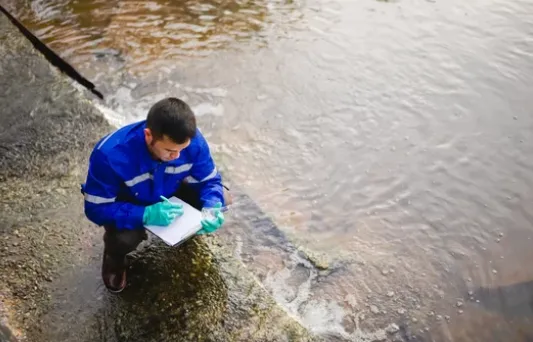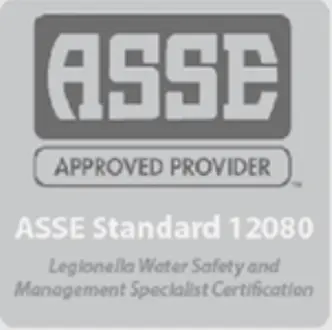If your commercial, industrial, or mining operation discharges water not tied to your core processes, you may still need environmental permitting and it’s more complex than it seems.
Discharging nonprocess wastewater, such as water from HVAC systems, boiler blowdown, or cooling towers, still places your facility under the regulatory authority of the National Pollutant Discharge Elimination System (NPDES).
Even if your operations don’t involve direct industrial production, you’re required to disclose, monitor, and manage those discharges in accordance with environmental law.
Learn how we manage testing and compliance for a variety of non-potable water tests, including runoff, HVAC discharges, and industrial outflows.
What Qualifies as Nonprocess Wastewater?
Nonprocess wastewater includes discharges not directly involved in production activities. Examples include:
- Non-contact cooling water
- Air conditioning condensate
- Boiler blowdown
- Sanitary wastewater (e.g., restrooms)
- Cafeteria or kitchen water
- Stormwater or rooftop drainage entering permitted systems
These waste streams may still contain pollutants like suspended solids, ammonia, grease, or chlorine and must be monitored appropriately.
If stormwater runoff enters your system, stormwater and runoff testing may also be required to evaluate contaminants and comply with your discharge permit.
PITS Environmental
From air quality to hazardous materials, our certified testing keeps you compliant and safe.
Why Permits Are Still Required
Under the Clean Water Act, any discharge into U.S. surface waters requires a permit, even if it seems clean.
Regulatory authorities assess:
Discharge points and flow frequency
Wastewater quality
Additives used in water systems
Flow type (seasonal or intermittent)
Treatment processes (if any)
Potential risks to the environment
To support this, facilities must complete the necessary documentation, including EPA Form 3510 2E, as part of their NPDES application.
Pollutants That Require Monitoring
Nonprocess wastewater may contain measurable levels of:
Total Suspended Solids (TSS)
Biochemical Oxygen Demand (BOD)
Ammonia
Oil and Grease
Fecal Coliform or E. coli (if sanitary discharges are present)
Chlorine (if used)
Chemical Oxygen Demand (COD)
Total Organic Carbon (TOC)
Applicants must test these parameters using approved EPA methods (40 CFR Part 136) or justify estimates through engineering studies.
For accurate lab results and compliance-ready documentation, explore our wastewater testing solutions designed for commercial and industrial discharge.
Ensure your property meets all safety standards with our comprehensive testing services
What If You’re a New Discharger?
If your facility hasn’t begun discharging yet, you still need to:
- Estimate pollutant levels using engineering data or comparable facilities
- Submit actual testing results within 24 months of first discharge
- Maintain documentation and test methods
- Notify the permitting authority if discharge characteristics change
What Should Be Included About Treatment?
Even basic treatment systems, like grease traps, neutralization tanks, or filters, must be described in the application.
Details should include:
Type of system (physical, chemical, biological)
Specific treatment processes used
What the system is designed to remove
Flow volumes and system capacity
Risks of Noncompliance
Failing to comply with wastewater permitting and monitoring can result in:
Delays in project approvals
Civil or administrative penalties
Shutdowns or stop-work orders
Long-term permit complications
Reputational and financial consequences
Worried About Hidden Toxins?
Protect Your Property and Health. Schedule a Certified Environmental Inspection Today.
How PITS Environmental Supports You
PITS Environmental helps commercial and industrial facilities manage their compliance responsibilities efficiently. Our services include:
Water quality sampling for nonprocess wastewater.
Laboratory testing per EPA-approved methods
Completion support for NPDES-related documentation
Interpretation of results and regulatory guidance
Consultation on treatment upgrades and risk mitigation
If your current provider isn’t a CDC ELITE participant, or if you’re unsure whether their methods meet industry standards, it may be time to re-evaluate. The safety of your occupants and the reputation of your facility depend on it.
Our industrial discharge testing services help facilities stay ahead of permit renewal deadlines and regulatory audits.
Final Thoughts
Even nonprocess wastewater matters. What seems minor, cooling water, washdown, or bathroom waste, can pose regulatory and environmental risks if not properly managed.
If you’re planning a new facility, modifying discharges, or renewing a permit, ensure you’re fully compliant.


